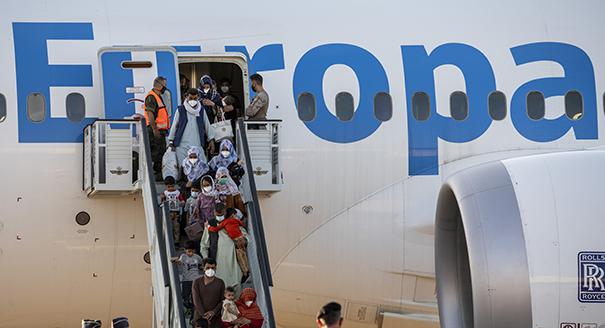In an interview, Yasmine Zarhloule discusses irregular migration to Europe and the shortcomings of a securitization policy.
Rayyan Al-Shawaf
{
"authors": [
"Michael Young"
],
"type": "commentary",
"blog": "Diwan",
"centerAffiliationAll": "dc",
"centers": [
"Carnegie Endowment for International Peace",
"Malcolm H. Kerr Carnegie Middle East Center"
],
"collections": [],
"englishNewsletterAll": "menaTransitions",
"nonEnglishNewsletterAll": "",
"primaryCenter": "Malcolm H. Kerr Carnegie Middle East Center",
"programAffiliation": "MEP",
"programs": [
"Middle East"
],
"projects": [],
"regions": [
"South Asia",
"Afghanistan",
"Western Europe",
"Central Asia"
],
"topics": [
"Political Reform"
]
}
Source: Getty
In an interview, Rosa Balfour discusses European tensions with the United States over the chaotic Afghanistan withdrawal.
Rosa Balfour is director of Carnegie Europe. Her fields of expertise include European politics, institutions, and foreign and security policy. Balfour’s current research focuses on the relationship between domestic politics and Europe’s global role. She has researched and published widely on issues relating to European politics and international relations, especially in the Mediterranean region, Eastern Europe and the Balkans, EU enlargement, international support for civil society, and human rights and democracy. Diwan interviewed Balfour in early September, in the aftermath of the U.S. withdrawal from Afghanistan, which generated much criticism in Europe, to get a sense of how U.S.-European relations in the broader Middle East might be affected by this.
Michael Young: The U.S. withdrawal from Afghanistan has led to tensions between the United States and Europe, as European states believe that Washington did not adequately consult with them or listen to their requests that the pullout be delayed. What has been behind the European thinking on this?
Rosa Balfour: Insufficient consultation and coordination on the evacuation from Afghanistan was seen as a stab in the back of the Trans-Atlantic relationship in some European capitals. In London and Berlin politicians were up in arms. In the post-Brexit United Kingdom, where Prime Minister Boris Johnson unsuccessfully tried to propose a longer evacuation timetable, senior politicians in the government and opposition are wondering about how special the “special relationship” with the United States actually is. In Berlin, allies are dismayed that after repeated messaging from U.S. President Joe Biden about listening to partners, the departure from Afghanistan was seemingly announced with minimal consultation and cooperation over the chaotic evacuation. Paris, conversely, sees that it was vindicated in its arguments that the European Union should build its “strategic autonomy” and learn to act internationally independently of the United States—an aspiration that does not resonate with the more pro-NATO countries in Central Europe.
But if European shock and criticism run deep at the U.S. withdrawal for fulfilling an “imbecilic” political slogan to end so-called “forever wars,” to quote former British prime minister Tony Blair, no European government challenged the policy or offered to step up its commitment in Afghanistan to compensate for the U.S. retreat. Last week EU defense ministers discussed the creation of a Rapid Reaction Force of 5,000 troops but omitted to discuss its purpose. European countries are long weary of “forever wars.” Stepping up European responsibilities in security and defense is critical but needs to be framed by a strategy and shared understanding of purpose—both of which are missing.
MY: These tensions must be seen against a backdrop of growing differences between the Americans and Europeans that go back in time, but that reached a nadir under president Donald Trump. Do you think these differences are likely to widen in the future, and what will the consequences be?
RB: With former president Donald Trump, the chasm was wide because it was one of values. That is no longer the case (though one must not forget that Trump has some admirers and emulators in Europe too). Biden has lost credibility on the listening front but that does not mean differences will widen. Allies and partners who talk to each other can also discuss their differences. This is what has usually happened in the history of the Trans-Atlantic relationship, providing the shared interest in cooperating was real.
MY: The Middle East has been a place where U.S.-European tensions have often been highest, not least in the disagreement over Washington’s withdrawal from the nuclear agreement with Iran, but also on other issues. However, the region is also one where cooperation between the two sides is essential. Where do you see the relationship going when it comes to the issues dividing the United States and Europe in the Middle East? Toward a reinforcement of past collaboration, or the contrary?
RB: With the Biden administration, cooperation on addressing Iran’s nuclear proliferation resumed. Regardless of the eventual outcomes, the United States engaged with its partners to address a common problem and there is no reason to assume it cannot be replicated elsewhere in a targeted and ad hoc fashion.
For the United States, the withdrawal from Afghanistan and the prioritization of the rivalry with China is likely to mean lesser interest in the Middle East. Europe has lost enormous ground in playing even a minor role there and its policies are conditioned by a dystopian fear of immigration. The Middle East itself is geopolitically fluid, with relations among states in flux and greater brinkmanship among some of the region’s governments. It would make sense for Europe and the United States to collaborate more on joint concerns in the spirit of the Iran talks which, back in 2015, did reach their stated goals before being undone by the Trump administration.
MY: Much has been written about the philosophical differences between the United States and Europe when it comes to their foreign policy approaches. Do you see these differences persisting under the Biden administration, which had nevertheless been seen by Europe as a refreshing contrast to the Trump administration?
RB: It may be counterintuitive, but I think the United States is becoming in some ways more similar to European countries in its foreign policy. Ending “forever wars” is a clear and direct response to domestic politics. The notion of a “foreign policy for the middle class” too seeks to craft policies that resonate with Americans, moving away from the notion that the United States has an exceptional global mission. European foreign policy is also driven by domestic interests and concerns—indeed this is one of the reasons behind the EU’s eternal divisions over foreign policy.
MY: Ultimately, isn’t it healthy for Europe to break away from the relationship of dependency that existed for a long time with the United States, particularly on defense issues? That said, does Europe have the capacity and will to seek such independence?
RB: Of course, the European Union should commit to playing a greater role in managing its security and the United Kingdom should cooperate with the EU to that end. It’s a no-brainer. The Afghanistan debacle provides more ammunition in favor of “strategic autonomy,” but the debate, alas, is endlessly trapped in a false dichotomy whereby greater European autonomy would entail weakening the tie with the United States and commitments within NATO. Afghanistan, however, also revealed another sad reality, namely that Europe has neither a foreign and security policy—to prevent conflict or to build peace—nor does it have a migration and asylum policy to deal with the human displacement that has resulted from conflict.
Carnegie does not take institutional positions on public policy issues; the views represented herein are those of the author(s) and do not necessarily reflect the views of Carnegie, its staff, or its trustees.
In an interview, Yasmine Zarhloule discusses irregular migration to Europe and the shortcomings of a securitization policy.
Rayyan Al-Shawaf
Nevertheless, recent European and parliamentary elections have fed an increasing struggle over belonging.

Yasmine Zarhloule
For many in the society, the post-Ben Ali years were mainly about successive economic crises and political instability.
Jasmine Khelil
As students around the United States and Europe protest, the relationship of Western elites with Israel is being redefined.

Michael Young
When U.S. Patriots shot down an Iranian missile over Erbil on April 15, Kurds wondered why such defenses weren’t activated when they were attacked.
Wladimir van Wilgenburg